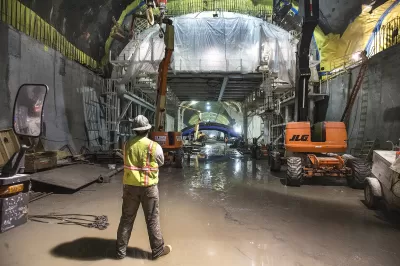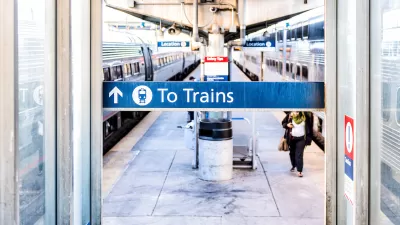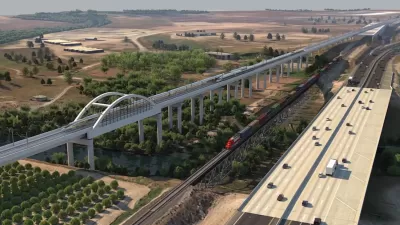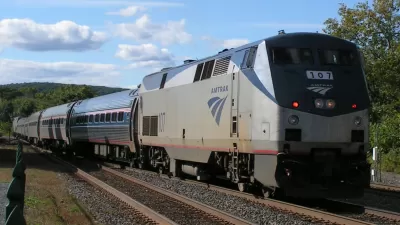Most major infrastructure projects fail to meet projected timelines or budgets. Some experts say this is a structural flaw built into "systematically deceptive" estimate practices.

California's High-Speed Rail. New York's East Side Access extension. Honolulu's light rail line. Ralph Vartabedian describes some of the infrastructure megaprojects that have run up against "cost overruns, engineering challenges and political obstacles that have made it all but impossible to complete a major, multibillion-dollar infrastructure project in the United States on budget and on schedule over the past decade." These persistent delays and cost overruns, writes Vartabedian, make it seem unlikely that the $1.2 trillion in new infrastructure promised by the Build Back Better bill will be completed anytime soon.
The $1.2 trillion package has bold goals, directing the majority of $500 billion to highways, $39 billion to urban transit, $65 billion to broadband projects and $73 billion to electrical grids, among other items. The nation’s busiest passenger rail line, Amtrak’s Boston-to-Washington corridor, would get the biggest slice of a $66 billion rail package. The infrastructure spending plan is unlikely to rescue some existing infrastructure projects that are bogged down with problems.
The ambitious timetable is hindered by sharply rising materials costs, shortages of skilled labor, and other supply chain factors, says Vartabedian. And this isn't a problem unique to the U.S.: an Oxford study of dozens of international projects found that 92 percent of them went over time and budget, pointing to "systematically and significantly deceptive" cost estimates.
In fact, experts argue that budget and time estimates are often flawed from the start. Former San Francisco mayor Willie Brown said the quiet part out loud in a 2013 newspaper column, calling the first budget for infrastructure projects "a down payment": "If people knew the real cost from the start, nothing would ever be approved. The idea is to get going."
FULL STORY: Years of Delays, Billions in Overruns: The Dismal History of Big Infrastructure

Maui's Vacation Rental Debate Turns Ugly
Verbal attacks, misinformation campaigns and fistfights plague a high-stakes debate to convert thousands of vacation rentals into long-term housing.

Planetizen Federal Action Tracker
A weekly monitor of how Trump’s orders and actions are impacting planners and planning in America.

In Urban Planning, AI Prompting Could be the New Design Thinking
Creativity has long been key to great urban design. What if we see AI as our new creative partner?

King County Supportive Housing Program Offers Hope for Unhoused Residents
The county is taking a ‘Housing First’ approach that prioritizes getting people into housing, then offering wraparound supportive services.

Researchers Use AI to Get Clearer Picture of US Housing
Analysts are using artificial intelligence to supercharge their research by allowing them to comb through data faster. Though these AI tools can be error prone, they save time and housing researchers are optimistic about the future.

Making Shared Micromobility More Inclusive
Cities and shared mobility system operators can do more to include people with disabilities in planning and operations, per a new report.
Urban Design for Planners 1: Software Tools
This six-course series explores essential urban design concepts using open source software and equips planners with the tools they need to participate fully in the urban design process.
Planning for Universal Design
Learn the tools for implementing Universal Design in planning regulations.
planning NEXT
Appalachian Highlands Housing Partners
Mpact (founded as Rail~Volution)
City of Camden Redevelopment Agency
City of Astoria
City of Portland
City of Laramie





























